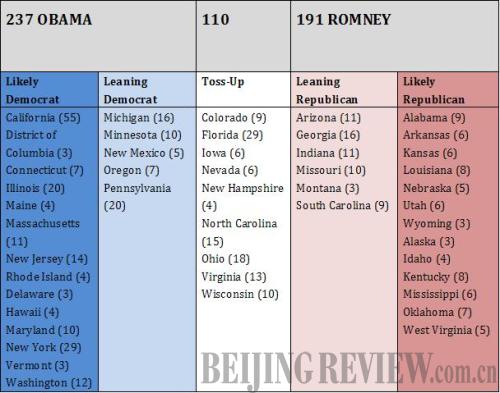|
The founding fathers of the United States had a disagreement when they were drafting the constitution. When planning out how American leaders would be elected in the fledging democracy, some said the uneducated masses couldn't be trusted in a strict popular vote, so the authority over picking the president should go to Congress. Not so fast, said critics, Congress could become corrupt with all that power and we'll end up with the unchecked rule of a king, or worse.
The solution was Article II of the Constitution—the Electoral College. This complex system allows citizens to vote for electors, who are then tasked with casting the official votes for president. The number of electors allowed in each state depends on how many representatives it has in Washington. Every state gets two electors (equal to the two Senators that represent each state) plus the number of its members in the House of Representatives (a population-based division of 435 fixed seats, creating one congressional district for each 674,000 residents and at least one per state.). The District of Columbia gets three electors. Overall there are currently 538 electors and presidential candidates must win the majority (270) to win the election. Confused yet? It gets worse.
Should none of the candidates win the 270 majority, then the election is decided by the House of Representatives. This has happened twice in the past, with the elections of Thomas Jefferson in 1801 and John Quincy Adams in 1825. In more recent history, candidates have won the national popular vote, but failed to win the combination of individual states that would give them the majority of electoral votes. This happened to Al Gore in 2000, Benjamin Harrison in 1888 and Samuel J. Tilden in 1876.
Most of the time, electors vote for whoever won the popular vote in their state, but there have been times when electors have been "faithless" and voted for another candidate – which is entirely legal. This bad behavior has not changed the course of any U.S. election, yet.
There are two systems used by states to direct electors in casting their votes. The first, and most widely used, is the "winner-take-all" system, in which all electors of the state cast their vote for the winner of the state's popular vote. The second, practiced in Maine and Nebraska, is the "district system" in which two electors vote for the winner of the popular vote and the remaining votes are divided by whomever won the specific district.
With all the complexities of the Electoral College, there are plenty of critics who say the system is outdated, unnecessary and downright un-American. One vote for every citizen is a true democracy, they say.
But is there any benefit to the Electoral College?
For one, the system creates balance. A strict popular vote could give rise to regionalism. For example, a popular candidate in the heavily populated East Coast might propose to cut farm subsidies for rural areas and lower taxes for city residents. The Electoral College gives less populated states a stronger voice in national elections. Second, the system supports Federalism, which was designed to give political power on the state level, rather than the national level.
Obama vs. Romney
So what paths do President Obama and Governor Romney take on the road to 270 electoral votes?

Even the most favorable predictions for Gov. Mitt Romney present a challenge to reach 270. Ohio, Florida, Virginia and North Carolina are the major swing states for the election, and Romney must win at least three of those states to win. With the selection of Wisconsin congressman Paul Ryan as a running mate, he seems likely to win Wisconsin (10). Losing in Ohio, where Obama has a lead, could prove a fatal blow because that state is considered a traditional "must-win" for successful Republican candidates. Romney will also have to win Florida and its treasure of 29 electoral votes.
President Obama is the favored to win, despite the near-tie in the polls. Should he lose Ohio, he can still win with a combination of Nevada, New Mexico, Arizona and Colorado—states that have been trending Democrat. Obama has been campaigning hard in Colorado, trying to win over the state's growing Latino population. Another factor in Obama's favor: he won all nine of the toss-up states in 2008.
The author is a freelance writer living in New York City | 